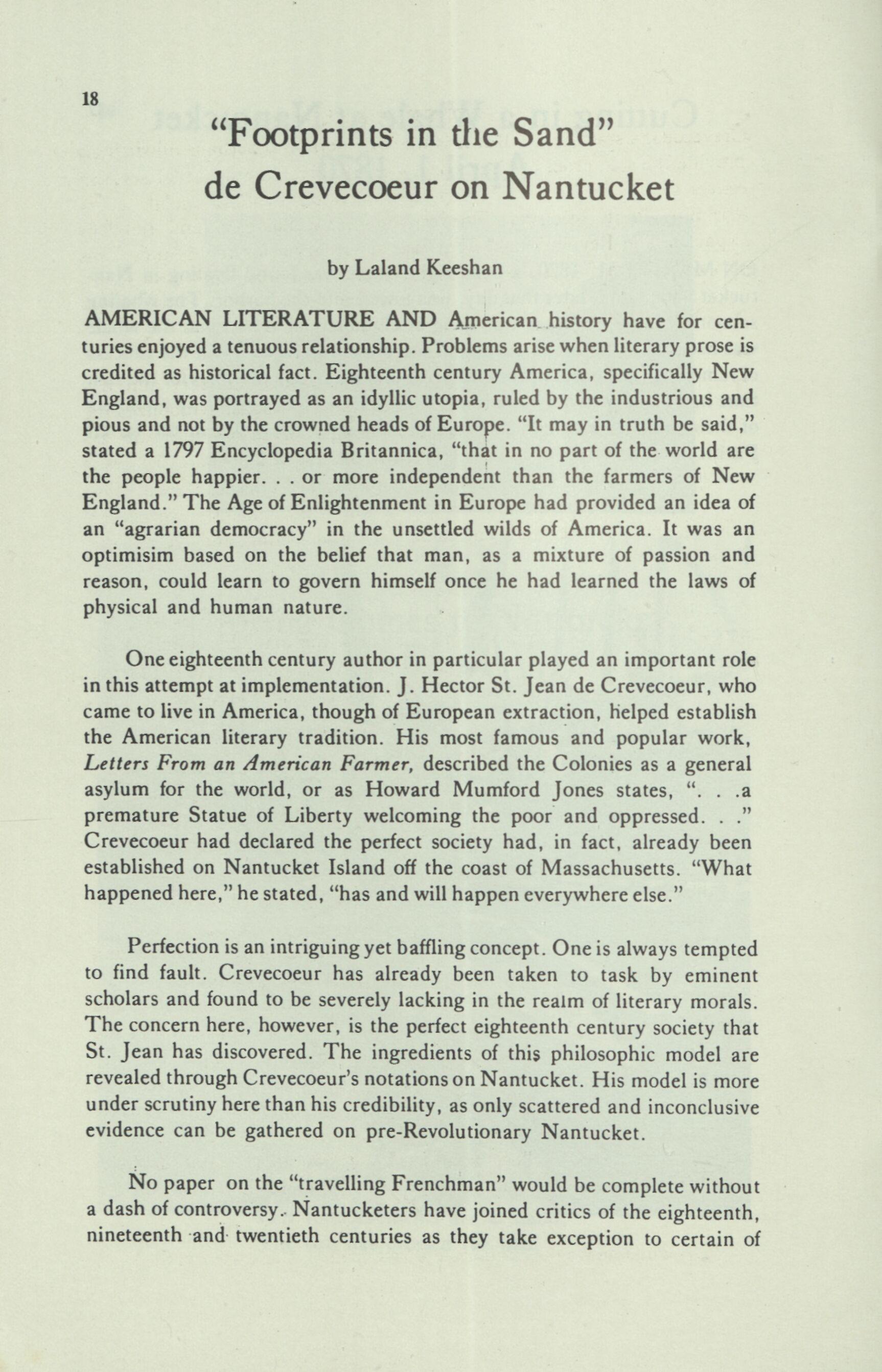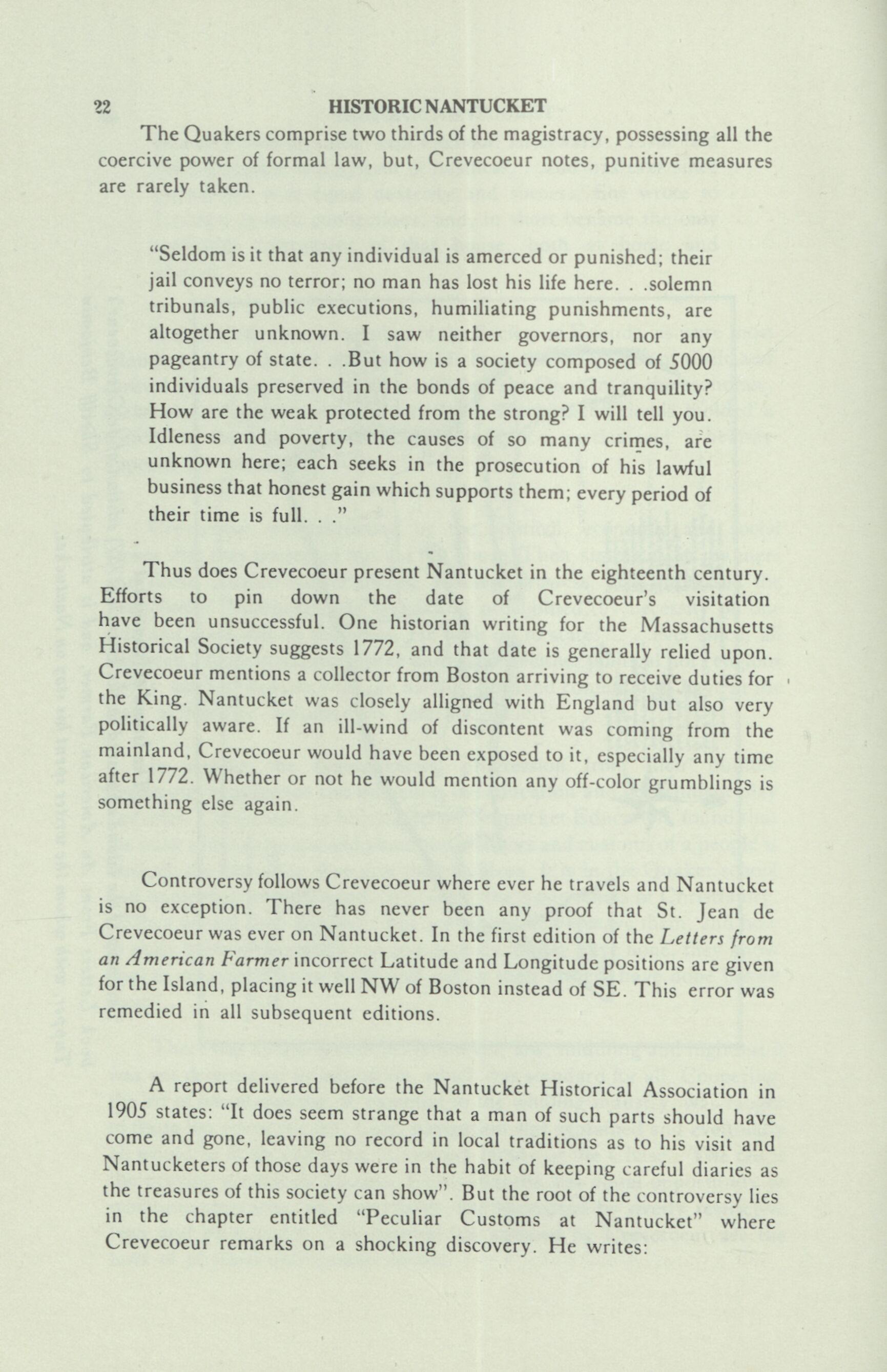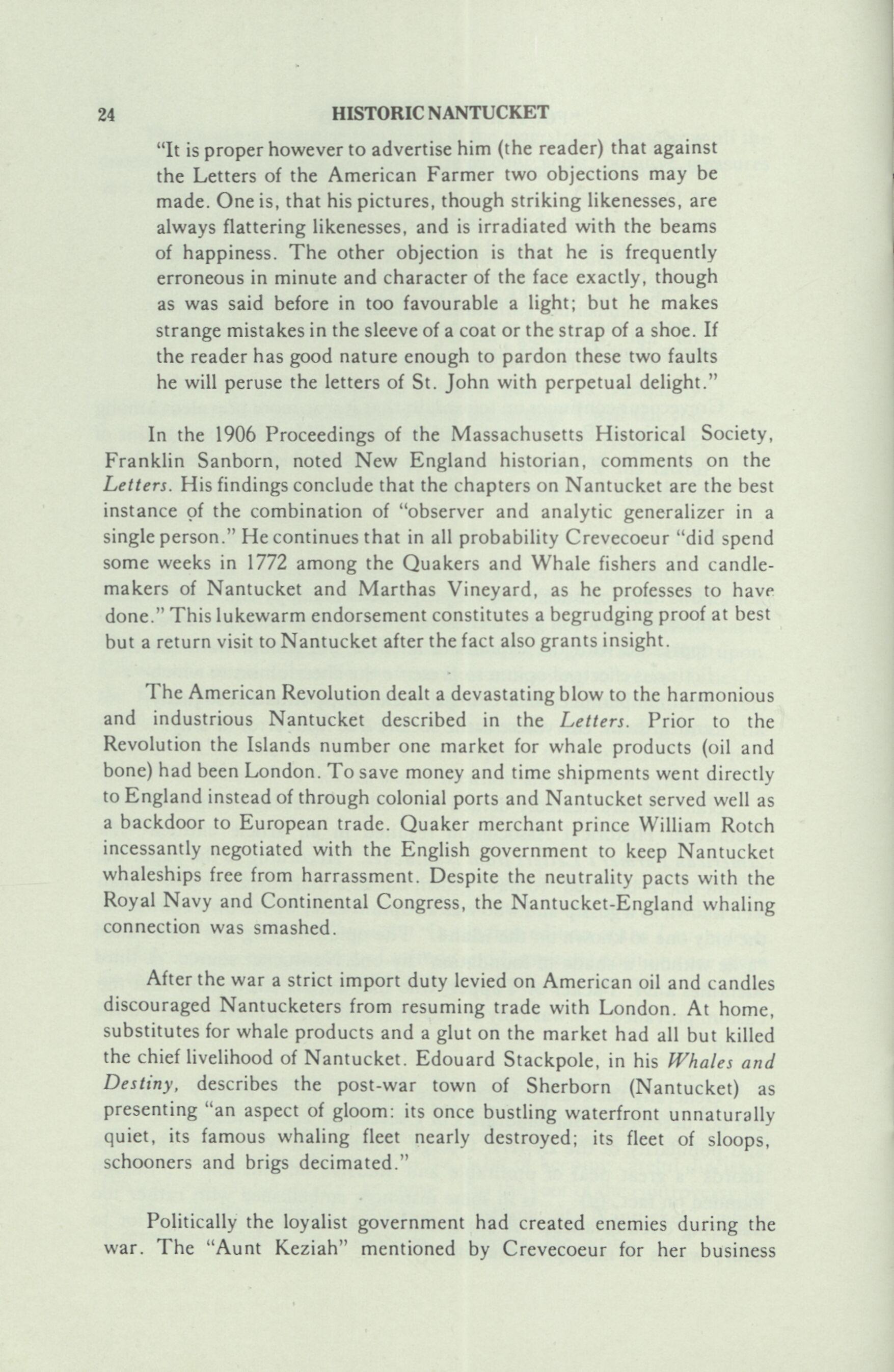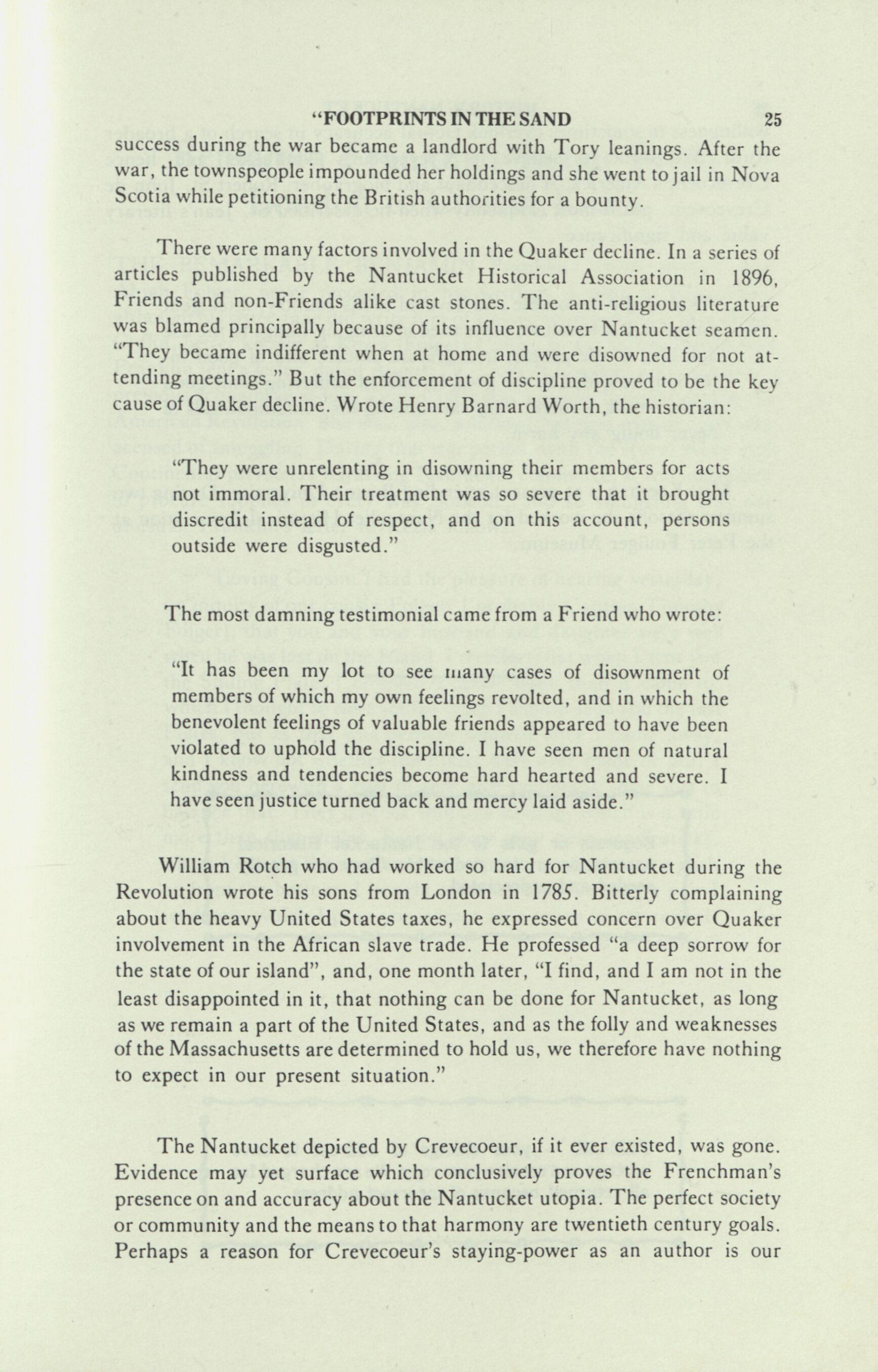
13 minute read
"Footprints in the Sand" — de Crevecoeur on Nantucket
by Laland Keeshan
AMERICAN LITERATURE AND Ajmerican history have for centuries enjoyed a tenuous relationship. Problems arise when literary prose is credited as historical fact. Eighteenth century America, specifically New England, was portrayed as an idyllic Utopia, ruled by the industrious and pious and not by the crowned heads of Europe. "It may in truth be said," stated a 1797 Encyclopedia Britannica, "that in no part of the world are the people happier. . . or more independent than the farmers of New England." The Age of Enlightenment in Europe had provided an idea of an "agrarian democracy" in the unsettled wilds of America. It was an optimisim based on the belief that man, as a mixture of passion and reason, could learn to govern himself once he had learned the laws of physical and human nature.
One eighteenth century author in particular played an important role in this attempt at implementation. J. Hector St. Jean de Crevecoeur, who came to live in America, though of European extraction, helped establish the American literary tradition. His most famous and popular work, Letters From an American Farmer, described the Colonies as a general asylum for the world, or as Howard Mumford Jones states, ". . .a premature Statue of Liberty welcoming the poor and oppressed. . ." Crevecoeur had declared the perfect society had, in fact, already been established on Nantucket Island off the coast of Massachusetts. "What happened here," he stated, "has and will happen everywhere else."
Perfection is an intriguing yet baffling concept. One is always tempted to find fault. Crevecoeur has already been taken to task by eminent scholars and found to be severely lacking in the realm of literary morals. The concern here, however, is the perfect eighteenth century society that St. Jean has discovered. The ingredients of this philosophic model are revealed through Crevecoeur's notations on Nantucket. His model is more under scrutiny here than his credibility, as only scattered and inconclusive evidence can be gathered on pre-Revolutionary Nantucket.
No paper on the "travelling Frenchman" would be complete without a dash of controversy. Nantucketers have joined critics of the eighteenth, nineteenth and twentieth centuries as they take exception to certain of
Crevecocurs statements. But it is the Islanders who perhaps unwittingly provide the sole proof of Crevecoeur's credibility. Nantucket letters and essays of the 1780's and 90's portray a bitter disillusionment, overwhelming in its intensity. The economic, psychological and religious impact of the Revolutionary War was devastating for the Island. This post-war depression strongly indicates a harmonious and prosperous Nantucket did indeed exist, perhaps the very society Crevecoeur described.
Literary scholar Elayne Rapping in her article, "Theory and Experience in Crevecoeur's America," states that Nantucket symbolizes the real translation of eighteenth century thought or theory into the experiential. The model social structure will just not fit anywhere else, as is evidenced by Crevecoeur's damning description of Charles Town. The role of nature is paramount -in establishing the model. Crevecoeur believed that nature and environment could define and guide the character of man.
If the land was sufficiently challenging, he felt, the time and the' energy invested would improve the quality of the man. He admired the improvement on nature, ". . .the landscape that is a made thing, a fusion of work and spontaneous process." His observation continued:

"On the contrary, when I meet with barren spots fertilized, grass growing where none grew before, grain gathered from fields which had hitherto produced nothing better than brambles; dwellings raised where no building materials were to be found; wealth acquired by the most uncommon means; there I pause, to dwell on the favourite sight of my speculative inquiries."
The Atlantic ocean represented an even rougher plain to furrow and certainly the "uncommon means" describes the Nantucket Whale Fishery, which was the Island's chief source of income. Industry and frugality were the key characteristics of Nantucketers. Idleness was the "most heinous sin" there and the object of compassion, comparable only to want and hunger. Even women were obligated. Whaling voyages averaged three to five years and wives were expected to "transact business, to settle accounts, and in short to rule and provide for their families". Crevecoeur mentions a particular woman; "Aunt Keziah" (Keziah Coffin Fanning) who had made her husband the richest on the Island". . . .
". . .while he was performing his first cruises, she traded with
20 HISTORIC NANTUCKET
pins and needles, and kept a school. Afterward . . .she laid the foundation of a system of business. . .and has ever since prosecuted with equal dexterity and success. She wrote to London, formed connections, and, in short became the only ostensible instrument of that house, both at home and abroad."
Keziah Coffin was a member of the Society of Friends, as were most Islanders. As a Quaker she displayed those characteristics of thrift and shrewd business savvy that had established the Quakers as the economic, social and religious leaders of the island. Nantucket Friends molded a society on the principles of order, temperance, justice and a healthy appetite for commerce.
Crevecoeur was fascinated by the political, economic and social power that they possessed but did not abuse. Their simplicity in manners and dress, coupled with a shrewd business prowess, also impressed the Frenchman. Nantucket was founded he proclaimed, by necessity on one side and good will on the other. He went on to state: ". . .ever since, all has been a scene of uninterrupted harmony. Neither political nor religious broils; neither disputes with the natives, nor land contentions, have in the least agitated or disturbed its detached society".

In tracing the Nantucketers' progression from their humble beginnings to affluence and influence, the education and government play key roles. Crevecoeur, in his chapter on Nantucket Education, found that the most that can be learned about the manners and customs of a people is through the education they give their children. It is in the Quaker school and home that young Friends are taught the basic tenets of Christianity. "If they are left with fortunes, they are taught how to save them, and how to enjoy them with moderation and decency; if they have none, they know how to venture, how to work and toil as their fathers have done before them".
There was a class system in Nantucket; low, middling and high but it was not determined by education, which was standard for all. Coopering, the art of barrel-making, so essential to the whaling industry, was taught to those too young for sea. Later navigation was explained and eventually all would be fit for either the "Counting House or the Chase". The sea is the proving ground for success. Every Islander has equal opportunity at maritime enterprise, an opportunity not hampered by overly restrictive laws and government. The rational law stressed by Crevecoeur are the laws of physical and human nature.
22 HISTORIC NANTUCKET
The Quakers comprise two thirds of the magistracy, possessing all the coercive power of formal law, but, Crevecoeur notes, punitive measures are rarely taken.
"Seldom is it that any individual is amerced or punished; their jail conveys no terror; no man has lost his life here. . .solemn tribunals, public executions, humiliating punishments, are altogether unknown. I saw neither governors, nor any pageantry of state. . .But how is a society composed of 5000 individuals preserved in the bonds of peace and tranquility? How are the weak protected from the strong? I will tell you. Idleness and poverty, the causes of so many crimes, are unknown here; each seeks in the prosecution of his lawful business that honest gain which supports them; every period of their time is full. . ."
Thus does Crevecoeur present Nantucket in the eighteenth century. Efforts to pin down the date of Crevecoeur's visitation have been unsuccessful. One historian writing for the Massachusetts Historical Society suggests 1772, and that date is generally relied upon. Crevecoeur mentions a collector from Boston arriving to receive duties for > the King. Nantucket was closely alligned with England but also very politically aware. If an ill-wind of discontent was coming from the mainland, Crevecoeur would have been exposed to it, especially any time after 1772. Whether or not he would mention any off-color grumblings is something else again.

Controversy follows Crevecoeur where ever he travels and Nantucket is no exception. There has never been any proof that St. Jean de Crevecoeur was ever on Nantucket. In the first edition of the Letters from an American Farmer incorrect Latitude and Longitude positions are given for the Island, placing it well NW of Boston instead of SE. This error was remedied in all subsequent editions.
A report delivered before the Nantucket Historical Association in 1905 states: "It does seem strange that a man of such parts should have come and gone, leaving no record in local traditions as to his visit and Nantucketers of those days were in the habit of keeping careful diaries as the treasures of this society can show". But the root of the controversy lies in the chapter entitled "Peculiar Customs at Nantucket" where Crevecoeur remarks on a shocking discovery. He writes:
"FOOTPRINTS IN THE SAND"
"A singular custom prevails here among the women, at which I was greatly surprised; and am really at a loss how to account for the original cause that has introduced in this primitive society so remarkable a fashion, or rather so extraordinary a want. They have adopted these many years the Asiatic custom of taking a dose of opium every morning; and so deeply rooted is it, that they would be at a loss how to live without this indulgence; they would rather be deprived of any necessary than forego their favourite luxury."
23
Crevecoeur continues on to explain that it was more prevalent among women than men. But he mentioned the sheriff: "He takes three grains of it every day after breakfast, without the effects of which, he often told me, he was not able to transact any business".
The Frenchman then launches into a bit of editorializing:
"It is hard to conceive how a people always happy and healthy in consequence of the exercise and labor they undergo, never oppressed with the vapours of idleness, yet should want the fictitious effects of opium to preserve the cheerfulness to which their temperance, their climate, their happy situation so justly entitle them. But where is the society free from error or folly. .

Nantucketers heatedly denied the "folly". Research compiled for the Nantucket Historical Association resulted in an article entitled "An American Farmer's Letters from Nantucket. "According to the paper the opium tale is believed "to have grown out of a magnified story of a man well known as a gossip and who was an opium eater by his own admission, the only one so known on the island." The opium tasting has been called "a lie without a shade of foundation" by one Nantucket source. A third identifies a Dr. Tucker or Tupper, who told author Crevecoeur that the custom prevailed: "It was only an old man's whim, and none other on the island."
Generally the Nantucketers were flattered by the literary attention, but not deceived. Contemporaries of Crevecoeur acknowledged the value and popularity of the Letters. George Washington wrote that the book affords "a great deal of profitable and amusive information. . . though founded on fact, (it). . . is in some instances embellished with rather too flattering circumstances." A Nantucket book review, published prior to 1807, warns of misrepresentation:
24 HISTORIC NANTUCKET
"It is proper however to advertise him (the reader) that against the Letters of the American Farmer two objections may be made. One is, that his pictures, though striking likenesses, are always flattering likenesses, and is irradiated with the beams of happiness. The other objection is that he is frequently erroneous in minute and character of the face exactly, though as was said before in too favourable a light; but he makes strange mistakes in the sleeve of a coat or the strap of a shoe. If the reader has good nature enough to pardon these two faults he will peruse the letters of St. John with perpetual delight."
In the 1906 Proceedings of the Massachusetts Historical Society, Franklin Sanborn, noted New England historian, comments on the Letters. His findings conclude that the chapters on Nantucket are the best instance of the combination of "observer and analytic generalizer in a single person." He continues that in all probability Crevecoeur "did spend some weeks in 1772 among the Quakers and Whale fishers and candlemakers of Nantucket and Marthas Vineyard, as he professes to have done." This lukewarm endorsement constitutes a begrudging proof at best but a return visit to Nantucket after the fact also grants insight.
The American Revolution dealt a devastating blow to the harmonious and industrious Nantucket described in the Letters. Prior to the Revolution the Islands number one market for whale products (oil and bone) had been London. To save money and time shipments went directly to England instead of through colonial ports and Nantucket served well as a backdoor to European trade. Quaker merchant prince William Rotch incessantly negotiated with the English government to keep Nantucket whaleships free from harrassment. Despite the neutrality pacts with the Royal Navy and Continental Congress, the Nantucket-England whaling connection was smashed.

After the war a strict import duty levied on American oil and candles discouraged Nantucketers from resuming trade with London. At home, substitutes for whale products and a glut on the market had all but killed the chief livelihood of Nantucket. Edouard Stackpole, in his Whales and Destiny, describes the post-war town of Sherborn (Nantucket) as presenting "an aspect of gloom: its once bustling waterfront unnaturally quiet, its famous whaling fleet nearly destroyed; its fleet of sloops, schooners and brigs decimated."
Politically the loyalist government had created enemies during the war. The "Aunt Keziah" mentioned by Crevecoeur for her business
"FOOTPRINTS IN THE SAND 25
success during the war became a landlord with Tory leanings. After the war, the townspeople impounded her holdings and she went to jail in Nova Scotia while petitioning the British authorities for a bounty.
There were many factors involved in the Quaker decline. In a series of articles published by the Nantucket Historical Association in 1896, Friends and non-Friends alike cast stones. The anti-religious literature was blamed principally because of its influence over Nantucket seamen. "They became indifferent when at home and were disowned for not attending meetings." But the enforcement of discipline proved to be the key cause of Quaker decline. Wrote Henry Barnard Worth, the historian:
"They were unrelenting in disowning their members for acts not immoral. Their treatment was so severe that it brought discredit instead of respect, and on this account, persons outside were disgusted."
The most damning testimonial came from a Friend who wrote:
"It has been my lot to see many cases of disownment of members of which my own feelings revolted, and in which the benevolent feelings of valuable friends appeared to have been violated to uphold the discipline. I have seen men of natural kindness and tendencies become hard hearted and severe. I have seen justice turned back and mercy laid aside."

William Rotch who had worked so hard for Nantucket during the Revolution wrote his sons from London in 1785. Bitterly complaining about the heavy United States taxes, he expressed concern over Quaker involvement in the African slave trade. He professed "a deep sorrow for the state of our island", and, one month later, "I find, and I am not in the least disappointed in it, that nothing can be done for Nantucket, as long as we remain a part of the United States, and as the folly and weaknesses of the Massachusetts are determined to hold us, we therefore have nothing to expect in our present situation."
The Nantucket depicted by Crevecoeur, if it ever existed, was gone. Evidence may yet surface which conclusively proves the Frenchman's presence on and accuracy about the Nantucket Utopia. The perfect society or community and the means to that harmony are twentieth century goals. Perhaps a reason for Crevecoeur's staying-power as an author is our










